Holland
Please Note: Firefox and some other search
engines are not suitable – Use “Internet
Explorer” for this page to load
perfectly!
Click the logo above to reach the ssMaritime FrontPage
for News Updates & “Ship of the Month”
With Reuben Goossens
Maritime Historian, Cruise‘n’Ship
Reviewer, Author & Lecturer
Please Note: All ssMaritime and my other related ssMaritime sites are 100%
non-commercial and privately owned sites. Be assured that I am NOT associated
with any cruise or shipping companies or travel/cruise agencies or any other
organisations! The author has been in the passenger shipping industry since May
1960 and is now semi-retired, but continues and I hope that the well over 635 features on Classic Liners and
Cargo-Passengers ships I have written on will continue
to provide classic ship enthusiasts and continue a great deal of information and
pleasure!
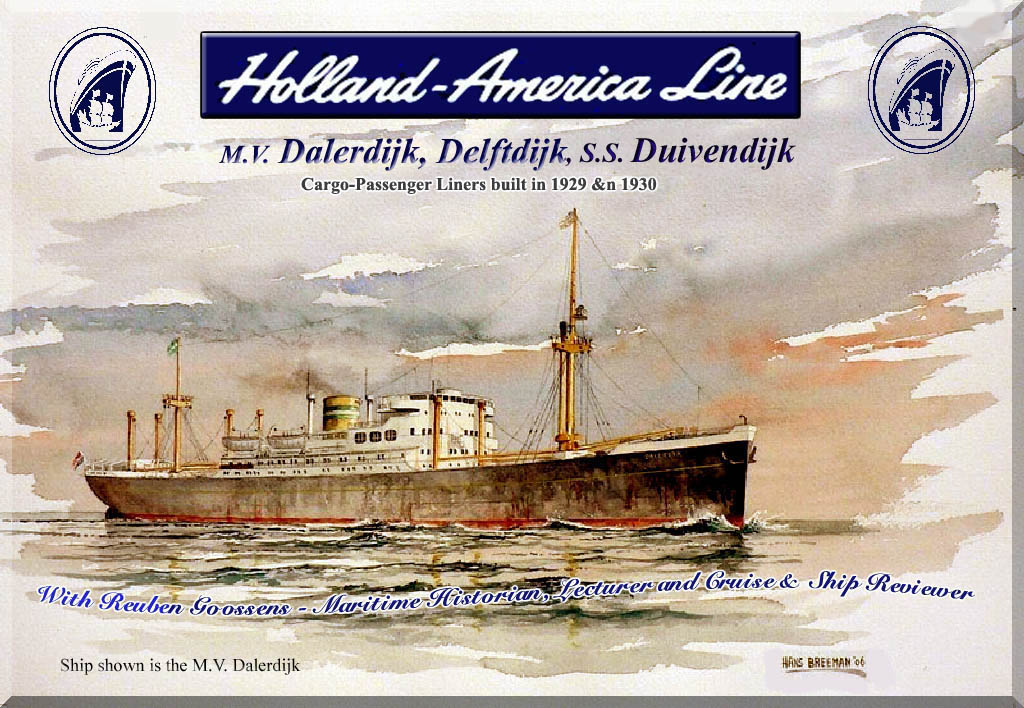
The original seen above, was painted
by the great Dutch Artist Hans Breeman - ENTER his website
The three 1929 to 1930
built Holland America Line (HAL) Combi-Liners or Cargo-Passenger Liners featured
on these two WebPages may seem rather basic looking ships, however these
ordinary Cargo-Passengers ships certainly did offer excellent HAL First Class
cuisine as well as the finest of service and in many ways these ships were the
very reason for HAL to commence to build a number of fine and much loved
Combi-Liners all having an increased passenger capacity. The earlier trio as
well as two of the newer ships operated between
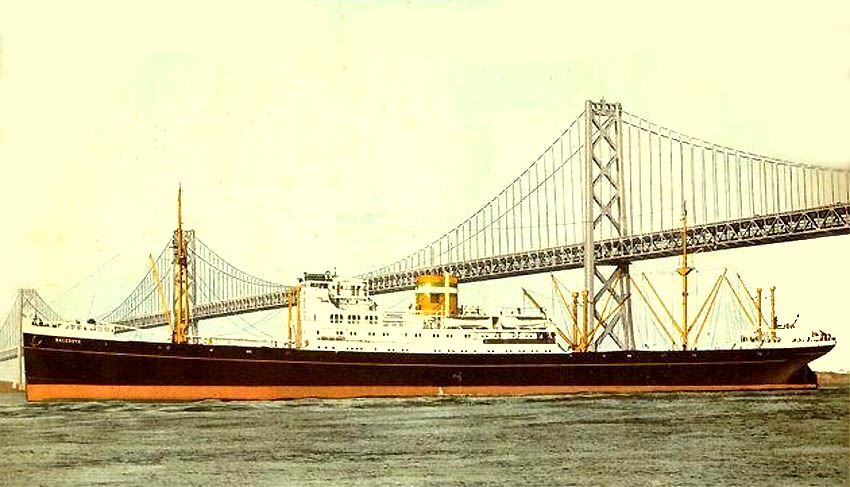
A
HAL postcard of the MV Dalerdijk is seen arriving in
The first of these new-builds was the 1938, 10,704 GRT (Gross Registered Ton) MS Noordam that accommodated 125 (later 150) First Class Passengers. Her almost identical sister, the MS Westerdam amazingly had been sunk three times during the war, twice by the Dutch Resistance so that the Nazis could not use her. After the War the unfinished ship was refloated and completed in 1946. She was larger at 12,149 GRT offering accommodations for just 134 First Class Passengers, with both ships providing the finest of comforts in all cabins, as well as having Private facilities in each one and featuring the most stunning public venues and vast Promenades and sport Decks as well as a swimming pool! Both ships sailed at an average of 17 knots.
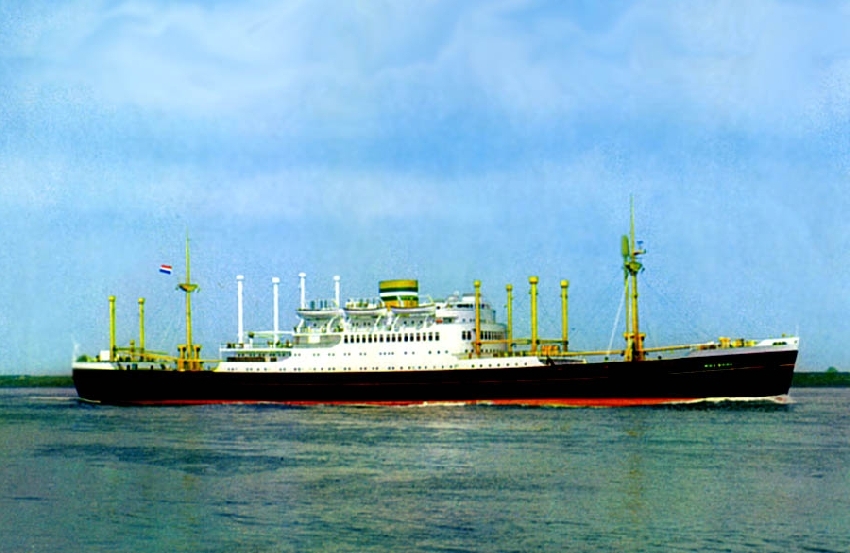
Above & below: Top we see the
superb Combi-Liners MS Noordam and below the Westerdam
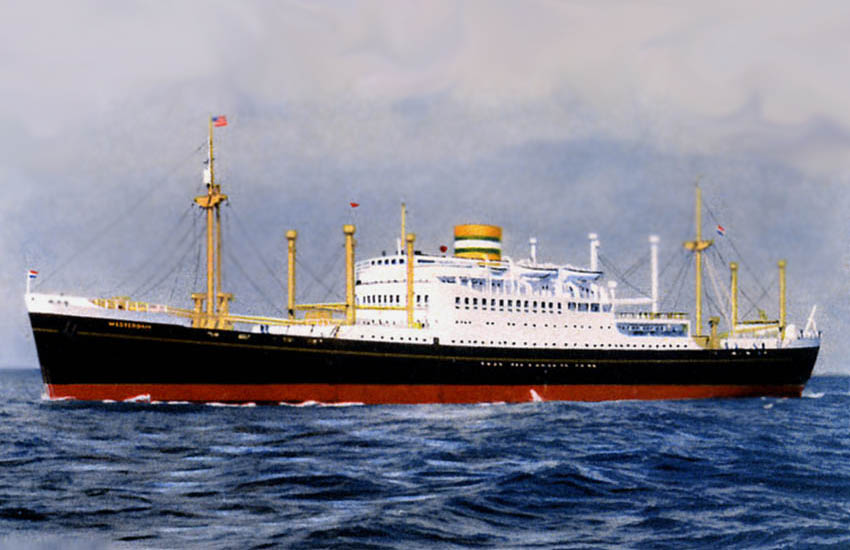
These ships were followed by another pair of Combi-Liners, the 11,195 GRT - 61 passenger SS Diemerdyk and the 11,366 GRT – 60 passenger SS Dinteldyk, which were built in 1950 and 1957 and both ships had a swimming pool
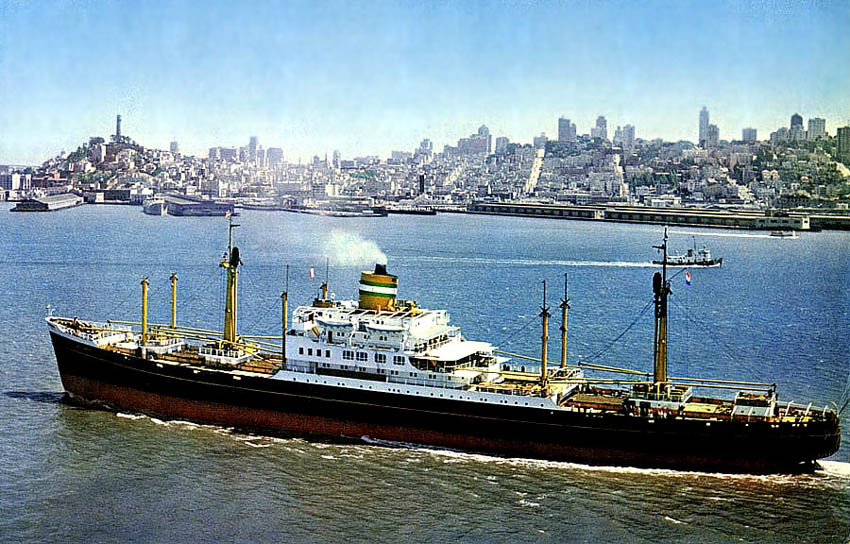
The SS Diemerdyk seen arriving in
PS: The seven years difference was mainly due because the hull for the second ship was used to build one of a pair of Tourist Class Passenger Liners that were in building and she was named the SS Ryndam, who with her sister the Maasdam set brand new standards in the Trans-Atlantic Tourist Class service. However, although being Tourist Class ships, they did offer what was known as the “Boat Deck Penthouse” for a mere 39 First Class deluxe passengers. Boat Deck offered a Lounge and a Bar as well as a Smoke Room located forward, with the Dining Room aft of the deck, with staterooms and suites amidships. In this way, Tourist Class had run of the rest of the ship!
M.V. Dalerdijk, M.V. Delfdijk, S.S. Duivendijk:
*It is important to note that the descriptions featured on this page for ships two and three, as well as the associated Deck Plans on Page Two, are all based on the ships mostly prior before World War 2, or shortly after. However each part will describe the history as they so vary!
However, these three very different liners, two Motor Ships and the Duivendijk being a Steam Ship for this ship was not for Holland America Line. However, with these three ships, HAL certainly did set very high onboard standard, just as it was expected on their main passenger fleet. For even on these Cargo-Passenger Liners passengers cold expect excellent service, fine food and the best facilities possible for a Cargo-Passenger ship. Although there would be no band on board, yet entertainment would be more like one of the crew or even a passenger that would sit down at the Grand piano in the Lounge and play a few tunes. Music would be played either as background music during the day, or as dance music on the “Gramophone” giving the guests an opportunity to make use of the dance floor in the Lounge, or out on deck on a warm and balmy evening when a buffet would be served! Or there were also various games passengers could partake off, such as the ever-popular horde racing. Passengers who sailed on these ships loved this style of travel and enjoyed the quieter life and the surroundings of the ships, being able to dine with the Captain in the evening as well as the senior officers. Life on these cargo ships was far better than many ever could have imagined!
Ship One - M.V. Damsterdijk - Dalerdijk - Dalerdyk:
The MV Dalerdijk was built
by
With the war having started, and although the Netherlands being a Neutral Country, sadly to the Nazis that meant nothing and in 1940 the Damsterdijk was seized by them and she was renamed the Mulhausen. However her duties are unknown.
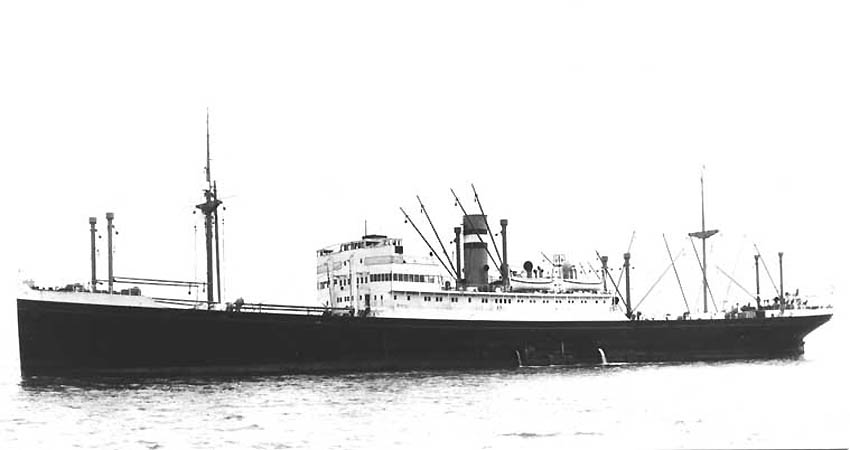
MV Damsterdijk is seen in 1947 before she was
refitted and renamed
In 1946 she was liberated
and returned to HAL and having received a minor refit she returned to her
regular service to
Her itinerary had already received a few changes being mostly for cargo reasons, but it the ports were wonderful for her passengers, as well as for the other ships on this service!
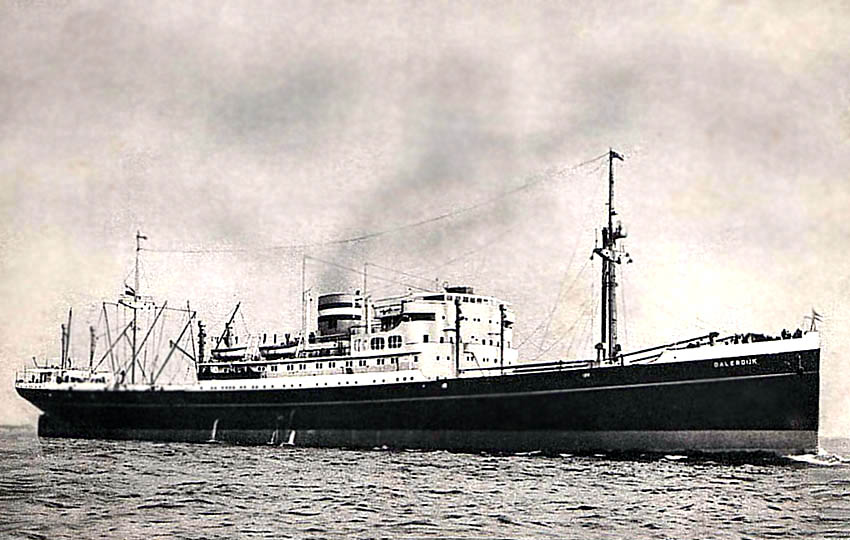
The Dalerdijk is seen after her refit
Itinerary
Returning
as follows:
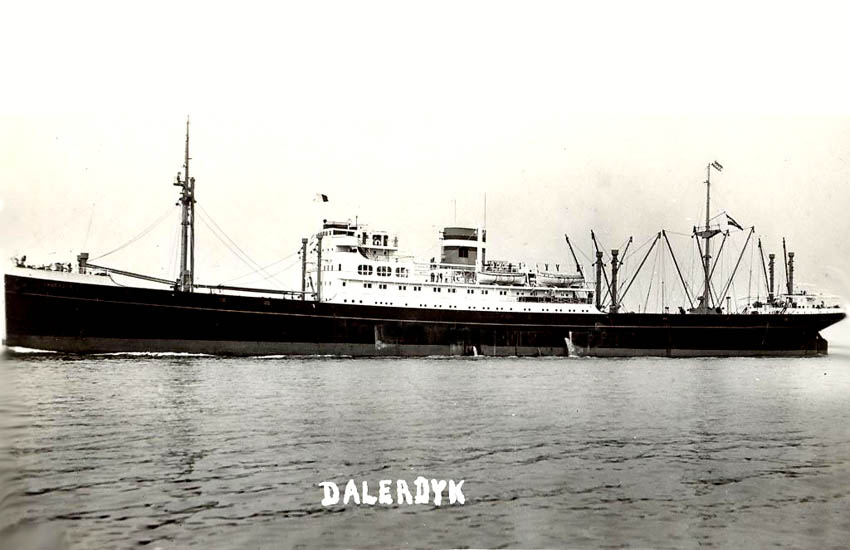
MV Dalerdijk
We will now look at the ships facilities and do this deck by deck commencing from the bottom deck on each ship and slowly head up to the top deck!
B Deck - Restaurant:
One deck down on B Deck forward of the Lobby and the wonderful curved stairwell was the dining Room that extended the full width of the ship and was bright and beautifully furnished and well known for the sliding window panels that depicted twelve of the “de la Fontaine” famed fables including; “The Crow and the Fox,” “The Hen and her Golden Eggs,” as well as others.
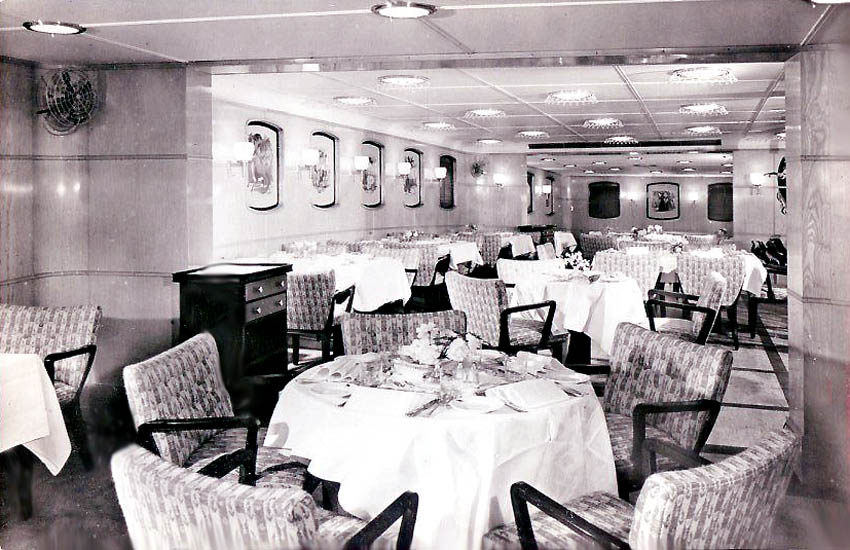
The delightful Dining room with many of the window panels shut,
revealing the famed fables
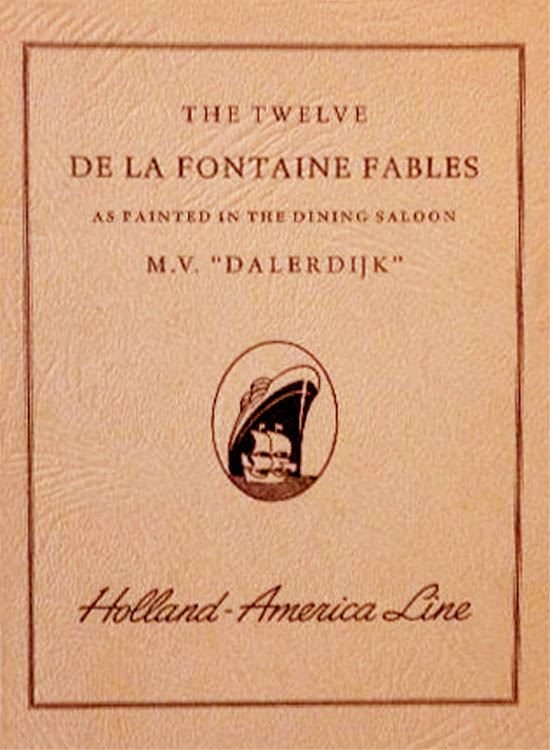
A 37-page booklet based on the famous panels with the “de la
Fontaine” fables
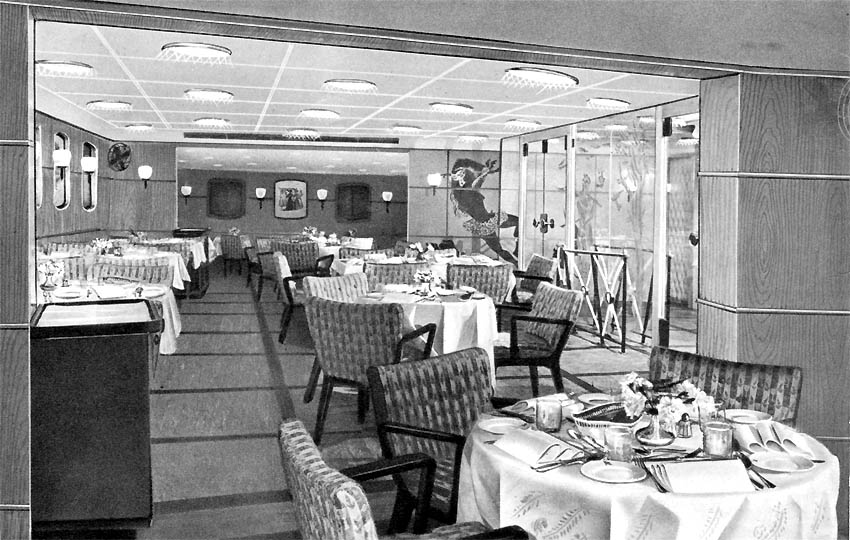
This photo reveals the beautiful all grand glass door entrance to the
Dining Room
Directly aft of the curved
stairwell, via the port side hallway is the doctor’s consultation room
for those in case they may need him during this long voyage to
A Deck - Accommodations:
The 10,820 GRT MV Dalerdijk offered excellent accommodations for 46 guests with all cabins located A Deck with having a window, except one two-berth cabin number 25, but all cabins had private facilities. The three berth cabins had a full sized bathtub as well as a separate shower, a basin with hot and cold water and WC, etc; the twin and single bed cabins all had a shower, a basin with hot and cold water & WC.
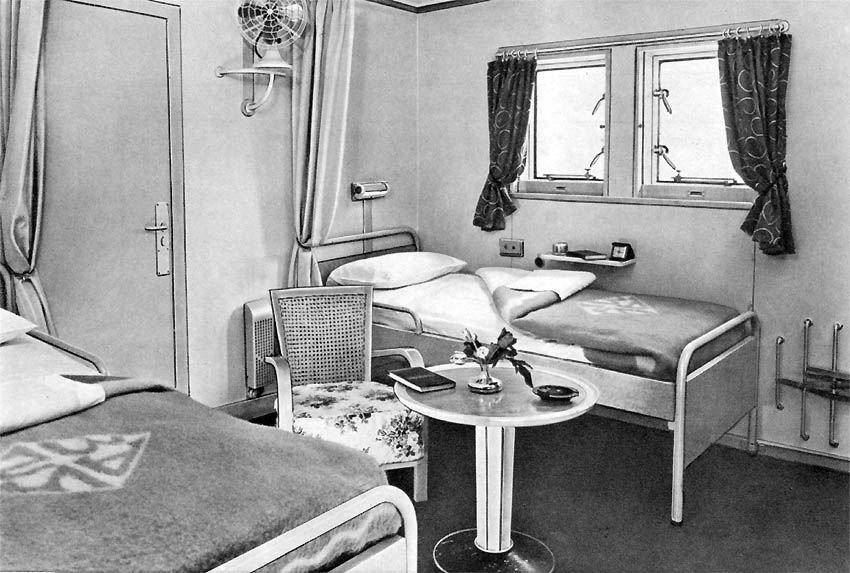
This Dalerdijk twin bedded cabin is typical of
all three ships
Aft was a Verandah Deck offering views over the ships aft decks, as well along the sides there were short narrow side decks available.
Boat Deck - Lounges:
We now reach Boat Deck via the ships magnificent fine walnut timber curved stairwell in the ships three level Foyer. Heading forward on this deck centred are beautifully sand blasted doors and as passengers entered this glamorous Lounge they saw a room that not only had plus carpets and luxuriant “furnishings,” but the walls were clad with the finest of timbers and wonderful items of art works. And as is customary with Holland America Line there are always fresh flowers in the room as well as throughout the ship! In the centre of the Lounge was a grand Piano for entertainment and as I said earlier anyone can play!
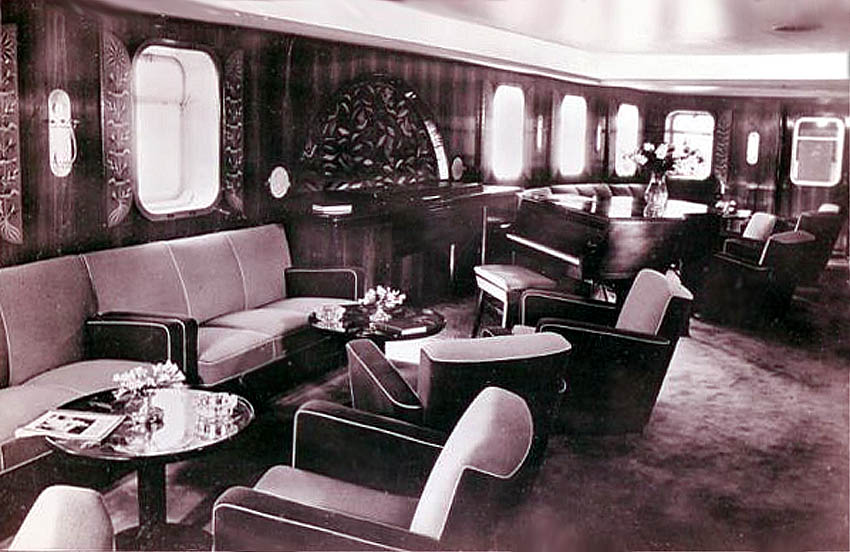
The elegant Lounge with all its rich timbers and comfortable furnishings
Returning to the Lobby and on the starboard side were twin glass doors that lead into another fine lounge, but this time it was the elegant Smoking Room and Bar. This venue featured many long sofas along the walls and tables and chairs in the middle. Again, as is typical with HAL, the décor was perfection and the Dalerdijk was the pride of the smaller Cargo-Passenger Fleet at that time.
Heading outside there were spacious glass enclosed and open Promenade Decks, with a Sports Deck located far aft.
Bridge Deck:
There was further exterior deck space available here and this could be reached via the exterior stairs. However, portside in lobby down on Boat Deck there was a semi-curved stairs heading up to Bridge deck, but only to the Radio Room. The actual Bridge was one deck higher on Navigation Bridge Deck!
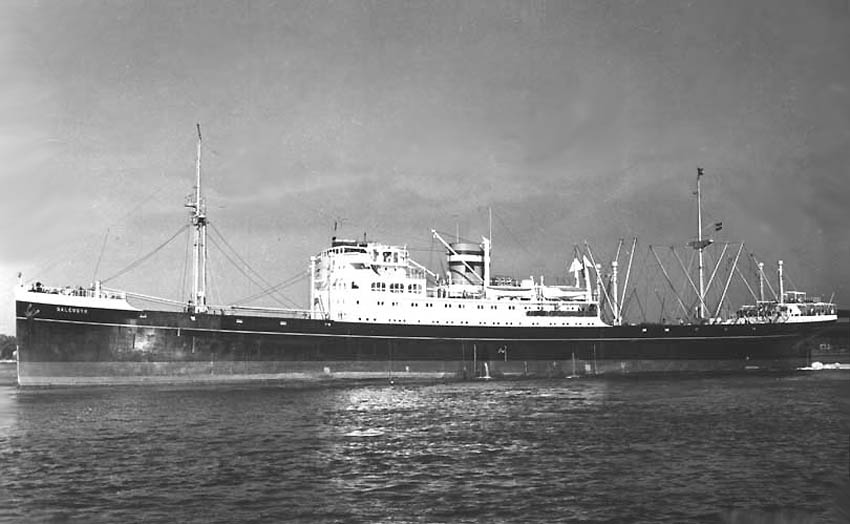
MV Dalerdijk seen during her final years with
her new name Dalerdyk
Why did all these ships end?
The MV Dalerdijk had a slight change to her name like all the ships that had “dijk” spelled with the Dutch “ij” being our “Y.” Thus, from the late 1950’s all ships had an “ij” like the SS Dalerdijk became Dalerdyk, etc. However as these ships entered the 1960s I am sure that we will be aware that “times were ‘a’ changing” in the shipping industry, but even more in the Cargo-Passenger area, being due to the change in cargo handling operations with containerisation!
Officially the first
commercially successful container ship was the 1948 built SS “Potrero Hills” that was an oil tanker. However in
1955 she was refitted to become a container ship and was renamed SS
“Ideal X.” And this ship departed on her maiden voyage as a
container ship on April 26, 1956 laden with 58 containers on her deck, from
Thus by the early sixties containerisation was taking over the older style cargo trade, but also these fine Combi-Liners was seeing their passenger loadings slowing down mostly due to air travel, but also as these voyages being rather long for some people in this new, modern and ever faster world.
Thus in 1963, HAL decided to sell the MV Dalerdyk and she was renamed Presvia and sadly, this ship that was much loved by many who had sailed on her, saw her head to a Japanese breakers yard to be broken up. This fine ship gave 33 years of excellent service!
****************************
Ship Two - M.V. Delftdijk - Dongedyk:
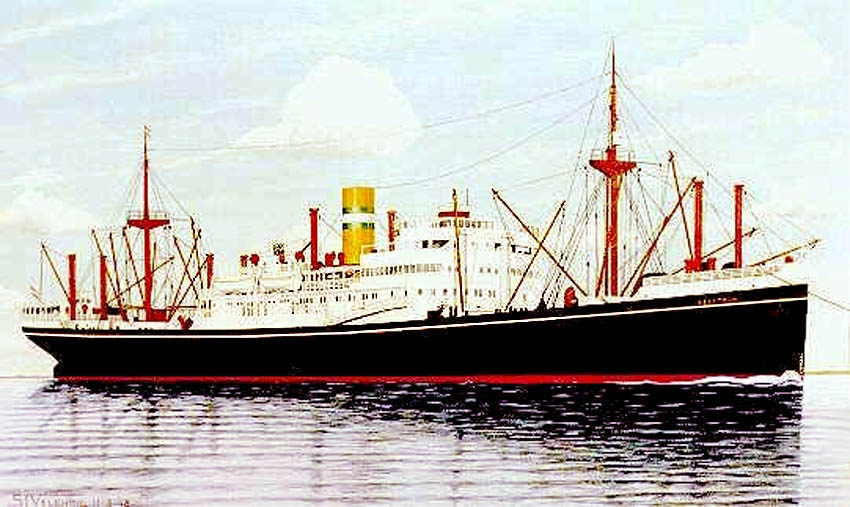
MV Delftdijk, painted by the late great Dutch artist; Mr Sjouke Jan
Veldhuis (1918-1997)
The 10,220 GRT - Delftdijk
was built in 1929 at
Bridge Deck:
This is the lowest deck in
the ships superstructure having square windows around it. This deck contains
five twin bedded cabin on both sides of the sips, thus ten in all, however all
cabins have a third upper
Far forward is the Main Lobby with its grand fine timbered stairwell heading u o Boat Deck and directly in front of it is the spacious Library with seating for 14 Guests. There are ample books and magazines, as well as games and cards. Amidships is the 42 seat Dining Room which extends the full width of the ship. The décor was light and modern with the usual HAL touches of fresh flowers and in the evening passengers would dine with the Captain and his senior Officers. Directly aft of the Dining Room on the portside is the doctor’s consultation room for anyone, should they need him during this long voyage.
Boat Deck:
Arriving at the top of the main stairs there is a choice of entering the Lounge on the two sides of the stairs through a single glass doors into a delightful and a charming Lounge with a hidden Bar on the starboard side aft. The Lounge was fully furnished in a casual wicker style of furnishings, but with high quality thick cushioned seats and comfy backs only has seating for 24 guests.
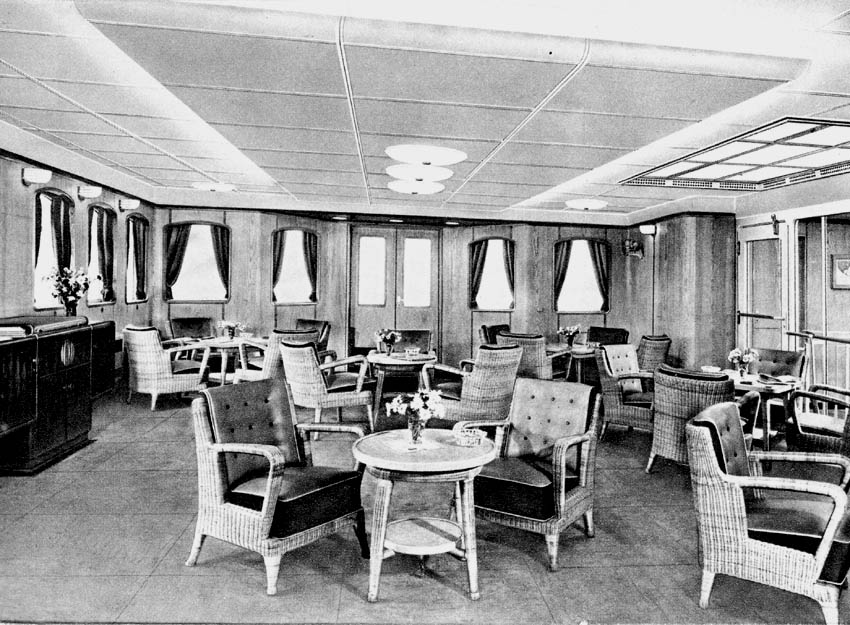
The smart Lounge on Boat Deck with its cosy wicker furniture, note the
walnut Gramophone on the aft wall
On both sides of the
lounge are the spacious fully glass enclosed Promenade Deck spaces, which are
also carefully furnished with wicker tables and chairs, sun lounges as well
with ample palms, etc. Thus making enclosed Promenade Decks more an attractive
and a relaxing
Post War Days to Her final Days:
Like all HAL ships, they were used for the War effort, and many ships sustained damage. And the Delftdijk was used during the WWII by the British Ministry and manned by the Dutch.
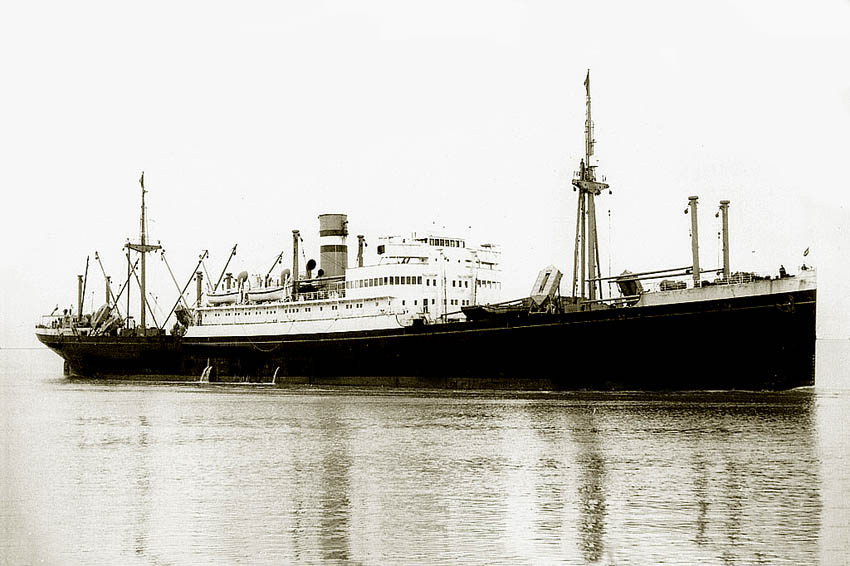
The MV Delftdijk is seen around the end of the war, but still
carrying
some of her additional lifesaving equipment
However, in March 1950 she
hit a mine in the
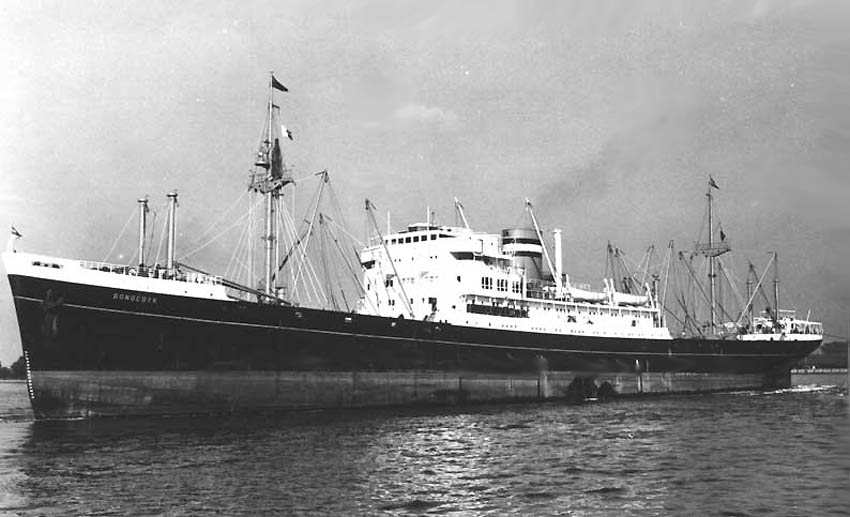
The MV Dongedijk now looks very similar to the Dalerdijk
But sadly, again due to
containerisation and passenger loadings, the Dongedyk was sold in 1966 to
Taiwanese breakers who renamed her “Tung Long” and she soon
departed and headed for
****************************
Ship Three - S.S. Duivendijk:
This ship was built for
the Hamburg America Line as the 8,269 GRT SS Vancouver by the Deutsche Werft
A/G.,

A typical looking German Combi-Liner SS Vancouver seen before the War
Having served for the German
Company for almost ten years, in May 1940 she was seized by the Royal Dutch
Marines and she was placed under the management of the K.N.S.M., being the
“Royal Netherlands Steamship Company” and she was renamed “
Then on July 3, 1946 she
was transferred to HAL for war reparations, as they had lost many ships, and
she received a comprehensive refit and was made ready for passenger service on
the
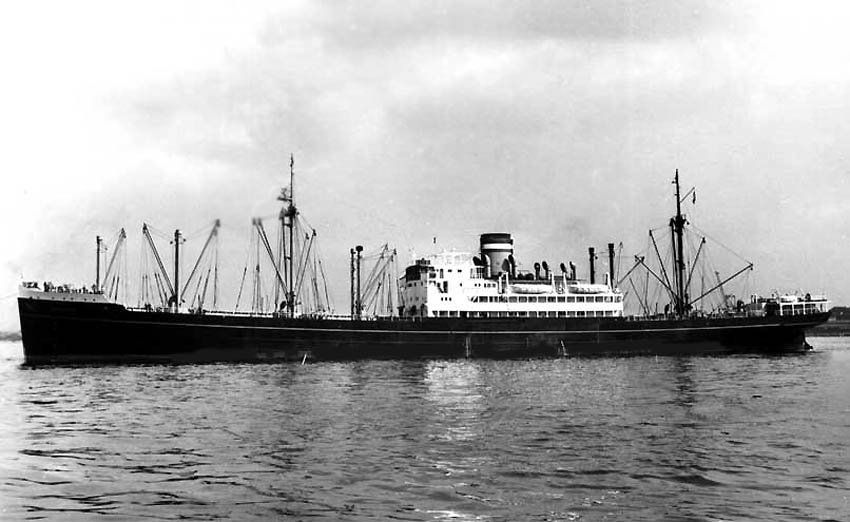
Here we see her as the
Promenade Deck:
This deck offered a wide U shaped Promenade Deck commencing aft for the public venues forward the extended the full width of the ship and then the deck wraps around the rest of the superstructure, offering ample space for relaxation and viewing opportunities as well as aft of the ship.
Far forward were all the ships Public Venues, with the Lounge located on the starboard and this venue was pleasant, but somewhat small, having seating for just 15 Guests. On the portside was the Smoking Room being the same size, with seating for 13 Guests. Although the plan does not show it, but a Bar would have been nearby. Between the two Lounges was the Dining Room that had seating for 48 Guests. Each venue was without doubt beautifully furnished, with touches of rich timbers, deep carpets and elegant décor s was the norm for HAL. But she was obviously not a Holland America Line built ship, for none of the cabins on this Deck had private facilities, thus all cabins on this deck have to use share facilities, making this the only One Class (Tourist) ship of the trio!, However, there were two deluxe Staterooms forward on Boat Deck that had a full sized bath room. All rooms did have windows offering natural light as well as fresh air whenever needed. However, she may have been regarded as a Tourist Class ship, but Holland America Line would never their high standard of service or excellent cuisine, for everything remained typically Holland America Line, even on a ship that really did not meet their very high standard!
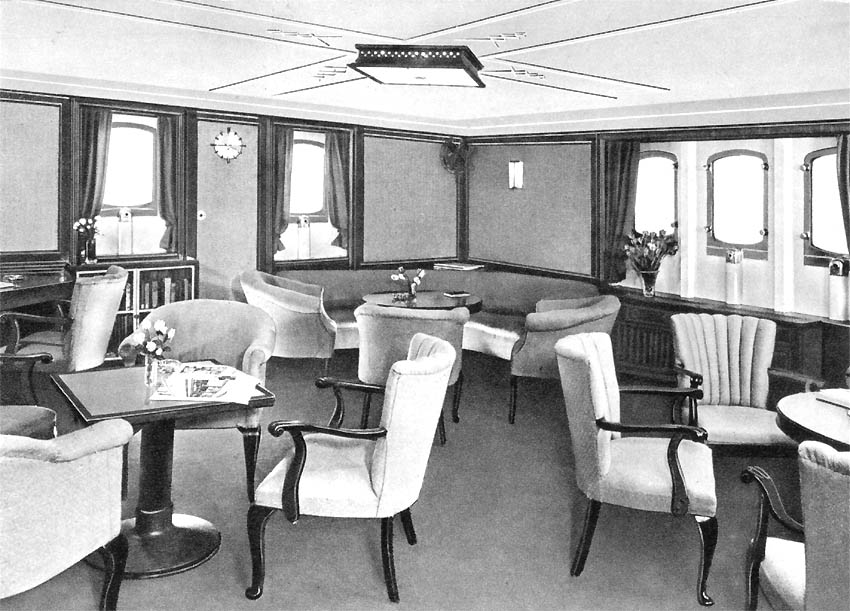
The ships Lounge was very pleasant
There were sixteen cabins on Promenade Deck, eleven of these where twin bedded cabins, one singe bedded cabin, and four single cabins, but these had a convertible sofa and thus could accommodate a second person. Thus her complement would be based on her normal berths on this deck as 27. Each cabin had one washbasin and a wardrobe per person. The showers and WC were located amidships, with bathtubs aft. However every cabin did have a sofa, but except those mentioned these sofas did not convert.
Boat Deck:
As we head up the staircase in the forward Lobby from Promenade Deck to Boat Deck, Deluxe Staterooms 1 and 2, were more spacious and had additional facilities including a full bathroom. In addition, just forward on the portside was the Doctor’s consultation rooms, and the Radio Room on the starboard side. However directly aft of the Deluxe Staterooms there were two door that took you out to a vast open Promenade and Sport Deck.
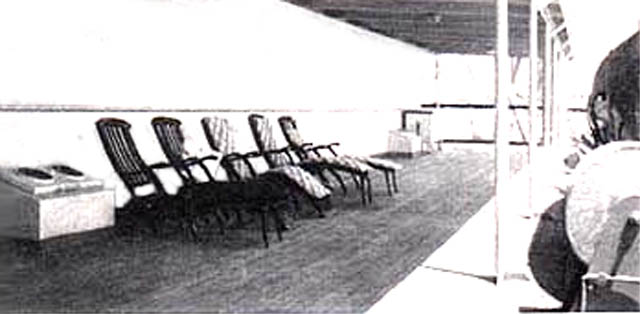
Portside Boat Deck Promenade
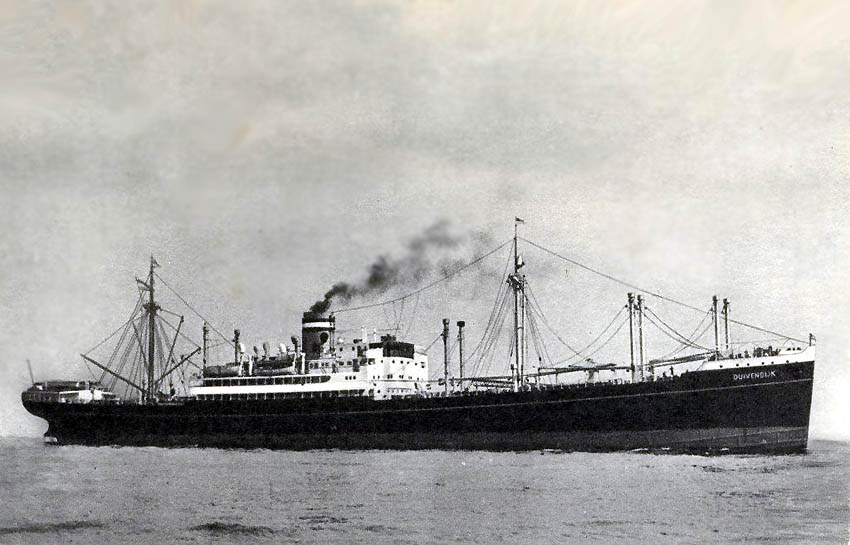
SS Duivendijk in the late 1940s
Her final Days:
No long having entered the 50s HAL decided to change her name to “Duivendyk” in 1953 just as they would do with all of their ships in due course, as the Dutch form of the “y” was hard to get used to!
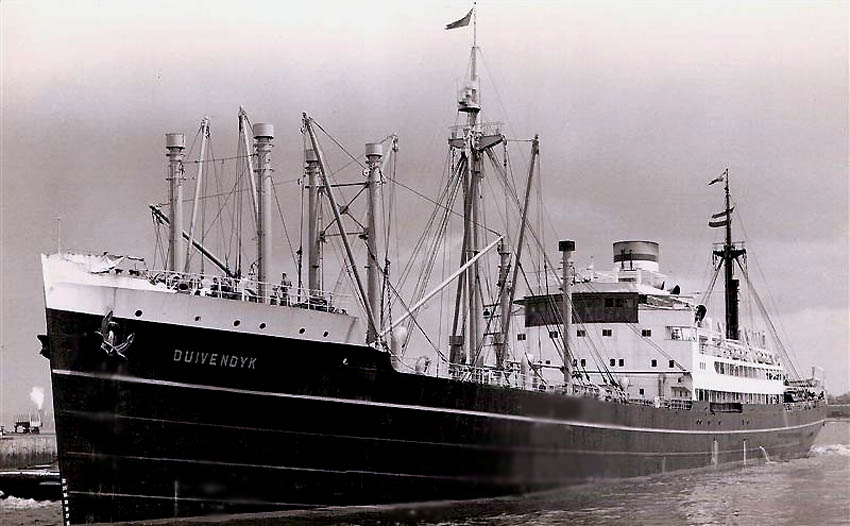
The SS Duivendijk is seen here renamed the Duivendyk in 1953
Her career with HAL had lasted for a good ten years, but still it was her difference, which was the reason that she was the first ships to leave this particular trio of Combi-Liners for in 1959 she was sold to Asian breakers and on July 28, 1959 she departed for Hong Kong where she would be broken up.
M.V. Dalerdijk, M.V.
Delfdijk, S.S. Duivendijk INDEX:
Page One -??????????????? The Ships History & Photo Page - This Page.
Page Two -?????????????? Their Deck Plans.
And ...
Feature
2 ?-????????????? The
MS Noordam & MS Westerdam.
Feature 3 -?????????????????????????? The
“Blue
Water Liners sailing to the distant shores.
I watched them come, I watched them go, and I watched them die.”
****************************
Visit our ssMaritime Main INDEX
Where you will discover more than 1,250 Classic
Passenger & Cargo-Passenger Liners!
ssMaritime.com & ssMaritime.net
Where the ships of the past make history
&
the 1914 built MV Doulos Story
Also visit my
“Save The
Classic Liners Campaign”
Please Note:
ssmaritime and associated sites are 100% non-commercial and the author seeks no funding or favours of any shape or form, never have
and never will!
Photographs on ssmaritime and associate
pages are by the author or from the author’s private collection. In
addition there are some images that have been provided by Shipping Companies and
private photographers or collectors. Credit is given to all contributors.
However, there are some photographs provided to me without details regarding
the photographer/owner concerned. I hereby invite if owners of these images
would be so kind to make them-selves known to me (my email address may be found
on www.ssmaritime.com only), in order that due credit may be given.
ssMaritime is owned &
? Copyright by
